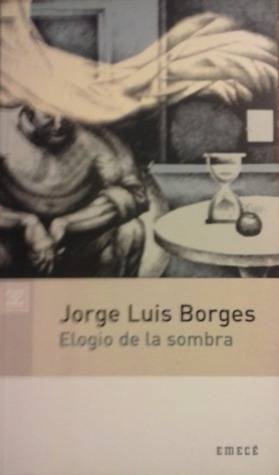27/12/15
The aesthetic event is something as evident, as immediate, as indefinable as love, the taste of fruit, of water. We feel poetry as we feel the closeness of a woman, or as we feel a mountain or a bay. If we feel it immediately, why dilute it with other words, which no doubt will be weaker than our feelings?
JLB on poetry (1977)

All the knowledge of the world emerges from the intricate depths of his consciousness. He mastered
the art of language by nourishing his mind—since an early age—with all the works of men and women that evoke eternity. Because of the touch of ancient gods or the wish of a forgotten mirror, he became one of those men.Yo temo ahora que el espejo encierreEl verdadero rostro de mi alma,Lastimada de sombras y de culpas,El que Dios ve y acaso ven los hombres.Now I fear the mirror may discloseThe true visage of my soul,Bruised by shadows and guilt,The face God sees and perhaps men see too.(from “El Espejo”, “The Mirror”)
Borges, the one that shattered his identity and left pieces of it inside the walls of the labyrinth, on the stairs of a library, hidden in the eyes of a tiger, within the heart of a woman that held him captive forever in the prison of rejection. The one that perfected the creative process of the short story, praising the transcendent melody of brevity over unnecessary length. The other Borges, the same, the one that beautifully crafted a poetry which encompasses all existence, every universe, all the seconds of infinity.
Sabía que el presente no es otra cosaque una partícula fugaz del pasadoque estamos hechos de olvidoHe knew the present is nothing buta fleeting particle of the pastthat we are made of oblivion(from “G. A. Bürger”)
Poems that no one should fear. They are filled with the benign bruises of time, with mythological references that leads you to the search for truth, with magical symbols and music, longings and tigers, wistful love and forsaken dust, nostalgia that becomes a habit of the soul, dreams of the world that belong to us and to anyone, books and some night out of a thousand. Odes to Iceland, France, Japan, Alexandria, the sand.
Buenos Aires lies in an hourglass.
Caja de MúsicaMúsica del Japón. AvaramenteDe la clepsidra se desprenden gotasDe lenta miel o de invisible oroQue en el tiempo repiten una tramaEterna y frágil, misteriosa y clara.Temo que cada una sea la última.Son un ayer que vuelve. ¿De qué templo,De qué leve jardín en la montaña,De qué vigilias ante un mar que ignoro,De qué pudor de la melancolía,De qué perdida y rescatada tarde,Llegan a mí, su porvenir remoto?No lo sabré. No importa. En esa músicaYo soy. Yo quiero ser. Yo me desangro.Music BoxMusic of Japan. Parsimoniouslyfrom the water clock the drops unfoldin lazy honey or ethereal goldthat over time reiterates a weaveeternal, fragile, enigmatic, bright.I fear that every one will be the last.They are a yesterday come from the past.But from what shrine, from what mountain’s slightgarden, what vigils by an unknown sea,and from what modest melancholy, fromwhat lost and rediscovered afternoondo they arrive at their far future: me?Who knows? No matter. When I hear it playI am. I want to be. I bleed away.
The book ends with a song to the night. Touching night. Dazzling night. Vindictive night that became the owner of his eyes. He was serene but I cannot forgive.
The night brings the sound of a distant bell. For whom the bell tolls? For Reality.
She pulls me away as I try to hold on to the poem I loved the most.
She pulls me away as I try to hold on to the poem I loved the most.
Las CausasLos ponientes y las generaciones.Los días y ninguno fue el primero.La frescura del agua en la gargantade Adán. El ordenado Paraíso.El ojo descifrando la tiniebla.El amor de los lobos en el alba.La palabra. El hexámetro. El espejo.La Torre de Babel y la soberbia.…Cada arabesco del calidoscopio.Cada remordimiento y cada lágrima.Se precisaron todas esas cosaspara que nuestras manos se encontraran.The CausesThe sunsets and the generationsThe days and none was first.The freshness of water in Adam’sThroat. Orderly paradise.The eye deciphering the darkness.The love of wolves at dawn.The word. The hexameter. The mirror.The Tower of Babel and pride.…Every arabesque in the kaleidoscope.Each regret and each tear.All those things were neededSo our hands could meet. *
* A much longer poem. It is still out there for you to find.
** Photo credit: Book cover via Goodreads.











